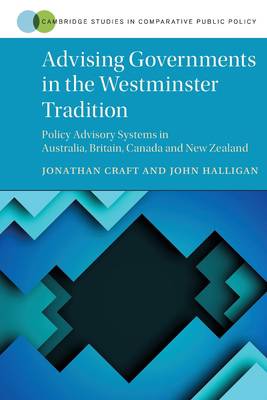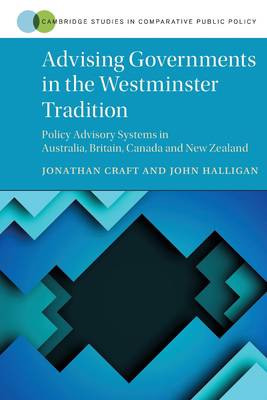
Je cadeautjes zeker op tijd in huis hebben voor de feestdagen? Kom langs in onze winkels en vind het perfecte geschenk!
- Afhalen na 1 uur in een winkel met voorraad
- Gratis thuislevering in België vanaf € 30
- Ruim aanbod met 7 miljoen producten
Je cadeautjes zeker op tijd in huis hebben voor de feestdagen? Kom langs in onze winkels en vind het perfecte geschenk!
- Afhalen na 1 uur in een winkel met voorraad
- Gratis thuislevering in België vanaf € 30
- Ruim aanbod met 7 miljoen producten
Zoeken
Advising Governments in the Westminster Tradition
Policy Advisory Systems in Australia, Britain, Canada and New Zealand
Jonathan Craft, John Halligan
€ 46,45
+ 92 punten
Omschrijving
In turbulent environments and unstable political contexts, policy advisory systems have become more volatile. The policy advisory system in Anglophone countries is composed of different types of advisers who have input into government decision making. Government choices about who advises them varies widely as they demand contestability, greater partisan input and more external consultation. The professional advice of the public service may be disregarded. The consequences for public policy are immense depending on whether a plurality of advice works effectively or is derailed by narrow and partisan agendas that lack an evidence base and implementation plans. The book seeks to addresses these issues within a comparative country analysis of how policy advisory systems are constituted and how they operate in the age of instability in governance and major challenges with how the complexity policy issue can be handled.
Specificaties
Betrokkenen
- Auteur(s):
- Uitgeverij:
Inhoud
- Aantal bladzijden:
- 294
- Taal:
- Engels
- Reeks:
Eigenschappen
- Productcode (EAN):
- 9781009380263
- Verschijningsdatum:
- 13/04/2023
- Uitvoering:
- Paperback
- Formaat:
- Trade paperback (VS)
- Afmetingen:
- 152 mm x 229 mm
- Gewicht:
- 394 g

Alleen bij Standaard Boekhandel
+ 92 punten op je klantenkaart van Standaard Boekhandel
Beoordelingen
We publiceren alleen reviews die voldoen aan de voorwaarden voor reviews. Bekijk onze voorwaarden voor reviews.









